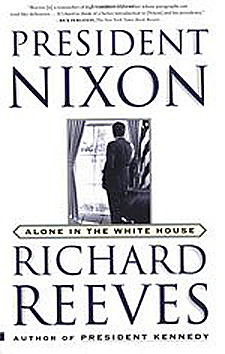On the website of the Richard Nixon Library & Birthplace, there is a page that lists the domestic and foreign policy achievements of the former US president Richard Nixon; indirectly, it suggests that some of his controversial decisions, such as the bombing of Cambodia, were successes. It's an impressive list that would lead any reader to think that the Nixon administration made nothing more than bold, life-changing decisions.
Of course, many achievements of the administration were unprecedented for their time and managed to re-shape the landscape of America and the world. However, the website conveniently overlooks the controversy of Watergate, the scandal that forced out the man who was the first US president ever to resign his office, as well as the strange elements of Nixon's own personality.
 According to Richard Reeves, author of President Nixon: Alone in the White House, the biographical account of Nixon's presidency, it was Nixon's personality that was the critical factor that contributed to the downfall of his administration. Nixon, it seemed, wanted only to be alone, thrived on conflict, gloried in manipulating social groups to suit his political needs, and avoided public consultation on policy decisions as much as possible. Nixon's greatest flaw was his chronic suspiciousness and paranoia.
According to Richard Reeves, author of President Nixon: Alone in the White House, the biographical account of Nixon's presidency, it was Nixon's personality that was the critical factor that contributed to the downfall of his administration. Nixon, it seemed, wanted only to be alone, thrived on conflict, gloried in manipulating social groups to suit his political needs, and avoided public consultation on policy decisions as much as possible. Nixon's greatest flaw was his chronic suspiciousness and paranoia.
He trusted no-one and regarded with intense personal malaise anyone who leaked information or double crossed his efforts. His desire to change the world seemed to overshadow any restraint that he may have had, a weakness that ultimately took him to commit his infamous crimes.
The Nixon in Reeves' book is one who had clearly lost his way spiritually and morally. Although politically he displayed nouse and surprising insight " often outwitting his opponents with clinical precision " he was deftly blinded to any concept of truth, of right-and-wrong, and of the reality of righteous judgement.
It reminds one of Mark 8:35-36, where Jesus said, "For whoever wants to save his life will lose it, but whoever loses his life for me and for the gospel will save it. What good is it for a man to gain the whole world, yet forfeit his soul?".
In the seat of high power, anyone would be capable of veering away from God, particularly if they compromised enough times and believed all the Nixonian lies of Watergate. Yet in doing so, the consequences are disastrous. Man can fall so far that he disgraces his nation, his office, his reputation, his family, his future, and even destroy his very soul.
When man has no fear of God and loses sight of where he stands in God's presence, the results are a disaster. The example of Nixon serves as a healthy reminder to any observer that a man's life does not consist in the abundance of his possessions (Luke 12:15), but in whether Jesus Christ is Lord. If man has that wrong, he loses all he has.






















